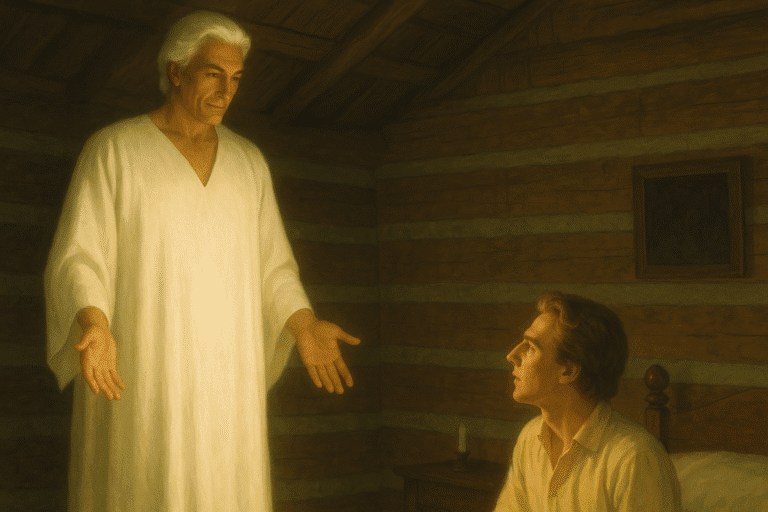Joseph Smith’s educational journey in becoming a translator of ancient scriptural records began as a young man. While searching for a church to join, he quickly realized “…that if any person needed wisdom from God, I did; for how to act I did not know, and unless I could get more wisdom than I then had, I would never know; for the teachers of religion of the different sects understood the same passages of scripture so differently as to destroy all confidence in settling the question by an appeal to the Bible” (Joseph Smith-History 1:12).
Joseph first exhibited his gift as a translator when through the power of God, he translated The Book of Mormon. However, he had at least two experiences with alternate renderings of the Holy Bible before the June 1830 start date of the “New Translation”, known today as the Joseph Smith Translation (JST). His first experience occurred during the appearance of the angel Moroni on 21-22 September 1823. The second recorded experience came as a result of a conversation Joseph and Oliver Cowdery had about the Apostle John in April 1829. Those two biblical experiences are found in Joseph Smith-History 1:36-39 (D&C 2) and D&C 7.
During the night of 21-22 September 1823, Joseph received his first visitation from the angel Moroni, the final prophet of the Nephite nation. A portion of that visitation is recorded in Joseph Smith-History, and D&C 2. D&C 2 is chronologically the first of 138 sections now canonized as LDS scripture. During his visitation Moroni quoted verses from several Old Testament prophets. Among them were verses from the Prophet Malachi. Moroni’s quotation of the Malachi verses read differently than those found in the King James Version (KJV) of the Holy Bible. Surprisingly Moroni’s alterations to Malachi did not make their way into the “New Translation”. This remarkable vision marked the first known incidence of Joseph receiving revelation that altered the reading and understanding of biblical scripture.
Moroni quoted the verses from Malachi as follows1:
Malachi 4:1, 4-6
1 For, behold, the day cometh, that shall burn as an oven; and all the proud, yea, and all that do wickedly, shall burn as be stubble; for they that come and the day that cometh shall burn them up, saith the Lord of Hosts, that it shall leave them neither root nor branch.
5 ¶ Behold, I will reveal unto you the Priesthood, by the hand of send you Elijah the prophet, before the coming of the great and dreadful day of the Lord.
6 And he shall plant in the hearts of the children the promises made to the fathers, turn the heart of the fathers to the children, and the hearts heart of the children shall turn to their fathers. If it were not so, the whole earth would be utterly wasted at his coming. lest I come and smite the earth with a curse.
Between 22 September 1827, when Joseph obtained the Nephite plates and April 1829, Joseph underwent some of the most severe trials of his early life. From the moment he received the plates every effort was made by nefarious people to steal them, and attempts were made on his life. He translated a few characters from the Nephite plates and gave them to Martin Harris, which were summarily dismissed by learned men of his day including Charles Anthon. He translated the Book of Lehi, some 116 pages of manuscript only to have Martin, his scribe who was allowed to take them in mid-June 1828, to convince his wife and several others of their veracity, carelessly lose them and seemingly place both Joseph and Martin on the brink of losing their souls2. He lost his first child, Alvin, on 15 June 1828, and almost lost his wife Emma as well.3
As a result of the loss of the 116 pages, the Urim and Thummim, along with the plates, were taken from him and for a time he lost his gift to translate. The Urim and Thummim were returned to Joseph briefly in July 1828, allowing him to receive D&C 3. It contained a severe chastisement from the Lord for the loss of the 116 pages, as well as a promise that if he would repent “…thou art still chosen, and art again called to the work”. The interpreters were then taken from him again until 22 September 1828, when they were returned exactly one year after he had initially obtained the plates.
At the end of what was certainly a most vexing year, Joseph’s efforts to translate had yielded 116 pages that were forever lost, and a few rejected characters. Yet, in that painful, hopeless, and most assuredly frustrating, and fearful time, Joseph learned a lesson that became the hallmark of his life, “when the Lord commands, do it!”4
Upon being forgiven by the Lord, the interpreters and plates were returned to Joseph, and the work of translation began again with Emma and briefly his younger brother Samuel H. Smith as his scribes. While the work of translating resumed, it was sporadic with numerous interruptions and delays. Emma was still suffering from the loss of her son Alvin, and her own near demise. Their efforts to sustain themselves and keep an orderly home added further delays in the translation effort. Finally, through the Lord’s intervention and inspiration, on 5 April 1829 a stranger, Oliver Cowdery, arrived at Joseph and Emma’s home in Harmony, Pennsylvania. Oliver immediately became Joseph’s scribe and on 7 April 1829, Joseph and Oliver began to translate and transcribe the plates together.
In April 1829, while Oliver was serving as Joseph’s scribe, the two were discussing the status of the Apostle John. The exact reason for their discussion is not fully known. Joseph and Oliver disagreed regarding the disposition of John as cited in John 21:20-23. They resolved to obtain an answer through the Urim and Thummim. Their answer, along with an explanation significantly more revealing than that found in John 21, was given to them5. The explanation indicated that John had recorded his interaction with the Savior on parchment and hid it up. John’s record is captured in D&C 7:
D&C 7:1-8
1 And the Lord said unto me: John, my beloved, what desirest thou? For if you shall ask what you will, it shall be granted unto you.
2 And I said unto him: Lord, give unto me power over death, that I may live and bring souls unto thee.
3 And the Lord said unto me: Verily, verily, I say unto thee, because thou desirest this thou shalt tarry until I come in my glory, and shalt prophesy before nations, kindreds, tongues and people.
4 And for this cause the Lord said unto Peter: If I will that he tarry till I come, what is that to thee? For he desired of me that he might bring souls unto me, but thou desiredst that thou mightest speedily come unto me in my kingdom.
5 I say unto thee, Peter, this was a good desire; but my beloved has desired that he might do more, or a greater work yet among men than what he has before done.
6 Yea, he has undertaken a greater work; therefore I will make him as flaming fire and a ministering angel; he shall minister for those who shall be heirs of salvation who dwell on the earth.
7 And I will make thee to minister for him and for thy brother James; and unto you three I will give this power and the keys of this ministry until I come.
8 Verily I say unto you, ye shall both have according to your desires, for ye both joy in that which ye have desired.
Oliver was also given his own revelation after desiring that he be able to translate. In that revelation the Lord told Oliver and Joseph that there were yet other records to be revealed and translated. In addressing Oliver, the Lord said:
D&C 6:25-28
25 And, behold, I grant unto you a gift, if you desire of me, to translate, even as my servant Joseph.
26 Verily, verily, I say unto you, that there are records which contain much of my gospel, which have been kept back because of the wickedness of the people;
27 And now I command you, that if you have good desires—a desire to lay up treasures for yourself in heaven—then shall you assist in bringing to light, with your gift, those parts of my scriptures which have been hidden because of iniquity.
28 And now, behold, I give unto you, and also unto my servant Joseph, the keys of this gift, which shall bring to light this ministry; and in the mouth of two or three witnesses shall every word be established. (italics added)
Soon after the publication of The Book of Mormon in March 1830, Joseph, with Oliver as his initial scribe, began the “New Translation” of the Holy Bible. Later it was followed by the compilation of the Doctrine and Covenants and from 1835-1842 the translation and publication of the Book of Abraham. In a revelation given on 7 March 1831, the Lord described to Joseph the importance of the “New Translation” when he instructed Joseph to temporarilydiscontinue translating the Old Testament and move to the New Testament:
D&C 45:61-62
61 Wherefore I give unto you that ye may now translate it [the New Testament], that ye may be prepared for the things to come.
62 For verily I say unto you, that great things await you;
It is interesting to note that among those things which “…await you;” were 74 of the 138 current sections of the Doctrine and Covenants, some of which can be traced directly to Joseph’s work on the “New Translation”, but that is another story.
From these early experiences of the Prophet Joseph, we can see that he was being prepared as a Prophet, Seer, Revelator, and also as a Translator of ancient scriptural records.
1 No alterations from Moroni’s quotation of Malachi are found in the JST. In this writing of the Malachi verses I have chosen to follow the convention used in The Joseph Smith Translation, Red-Letter Editions because in my opinion it makes the alterations read more smoothly. 2 Lucy Mack Smith, History, 1845, p. 131, The Joseph Smith Papers, accessed July 4, 2025, https://www.josephsmithpapers.org/paper-summary/lucy-mack-smith-history-1845/138?highlight=lost%20my%20soul 3 Lucy Mack Smith, History, 1845, p. 127, The Joseph Smith Papers, accessed July 4, 2025, https://www.josephsmithpapers.org/paper-summary/lucy-mack-smith-history-1845/134
4 History, 1838–1856, volume B-1 [1 September 1834–2 November 1838], p. 558, The Joseph Smith Papers, accessed July 4, 2025, https://www.josephsmithpapers.org/paper-summary/history-1838-1856-volume-b-1-1-september-1834-2-november-1838/12 5 History, 1838–1856, volume A-1 [23 December 1805–30 August 1834], p. 15, The Joseph Smith Papers, accessed July 9, 2025, https://www.josephsmithpapers.org/paper-summary/history-1838-1856-volume-a-1-23-december-1805-30-august-1834/21?highlight=parchment



















Alvin H. AndrewJuly 22, 2025
The Joseph Smith Translation, Red-Letter Editions referred to in this article can be obtained through the website https://jstrle.com/.